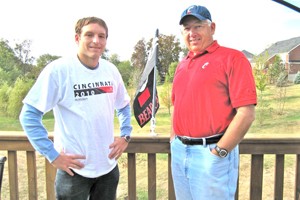
UC Alum Develops Anti-Terror Detection Technology
As the CEO of Valley Forge Composite Technologies Inc. in Covington, Ky., Louis Brothers has spent the last decade creating technologies to help fight terrorism. The UC alumnus (BS,78, Natural Science) and his company are developing anti-terror detection systems for airports and high-security prisons around the world.
Valley Forges bread and butter are two systems: the THOR-LVX Cargo and Baggage Screener and the ODIN Full-Body Scanner, devices that deliver advanced screening technologies not currently offered by the traditional x-ray machines being used.
Using high-energy particle accelerators for cargo and baggage screening, we initiate photonuclear reactions in the light elementsspecifically carbon, nitrogen and oxygen. By interrogating the secondary decay pattern, THOR-LVX can then analyze them and tell you what the elements are and their ratios.
In other words, THOR-LVX doesnt rely on a fuzzy image or physical appearanceit can actually analyze the chemical makeup of the objects in question and easily identify explosives.
This is groundbreaking, Brothers says. We hope that in the war on terror, it ends up being a device that can really make airplane travel safer and cargo containers easier to inspect.
Complementary to THOR-LVX is Valley Forges next-generational personnel screening technology ODIN. ODIN uses a transmission x-ray to detect metal and non-metal objects hidden on or in a human body. ODIN is still being tested for commercial use within the U.S. but some of these machines are already in use in airports worldwide.
In the first half of 2010, sales at Valley Forge exceeded $12.7M.

THOR-LVX.
Brothers began partnering with the Lawrence Livermore National Laboratory and Russias Lebedev Physical Institute immediately after 9/11 to better detect explosive materials concealed in airline baggage and cargo. He and his team of researchers have received funding from the Global Initiatives for Proliferation Prevention program sponsored by the National Nuclear Security Administration and the Department of Energy.
A self-proclaimed science nerd, learning the sciences at the University of Cincinnati is a Brothers tradition. His uncle Daniel Fieno (BA, 51, Liberal Arts) worked for NASA and his son,
, was a Presidential Cincinnatus scholar in the Departments of Chemistry and Biology before graduating in 2008. He is currently getting his PhD in chemical biology at University of Illinois at Urbana-Champaign with help from
a fellowship from the Department of Homeland Security
.
Other family members have attended UC as well, including Lous father, in-laws, cousins, nephews, and his wife Roe, whom he met in the student section at a UC football game.
In the family, I would guess that about 20 people went to UC, Brothers says. Though no longer in the student section, the Brothers brood still get together to support their university at UC football games.
My education at UC made a huge difference in my career, he says. What I came away withthe speech courses, the marketing and business information I learnedit helped to provide a solid base and an edge relative to graduates from other schools. And the science I learned was top notch.
Related Stories
UC Journalism to host Hall of Fame, Young Alumni Awards
Event: April 24, 2025 6:00 PM
The College of Arts and Sciences’ journalism department will host the Hall of Fame and Young Alumni Awards to celebrate the achievements and accomplishments of its graduates. Induction into the UC Journalism Hall of Fame is a special honor reserved for UC alumni who have excelled in the profession of journalism and media, or individuals who have made a significant contribution to journalism at UC.
Bradford pear trees look pretty, smell awful. Why are they...
April 2, 2025
WLWT talks to UC biology Professor Theresa Culley about Ohio's ban on the sale or planting of nonnative and invasive pear trees. The trees are showing up in many parks and wild areas where they are crowding out native species.
Bird-safe glass added to UC building
April 2, 2025
UC biologist Ronald Canterbury tells Fox19 that bird-safe glass in buildings can save untold numbers of birds.
